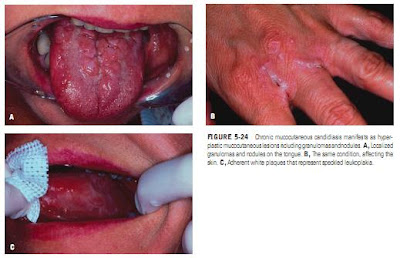Oral candidiasis is the most frequent opportunistic infection associated with immunocompromised individuals.
The role of weakened specific immune defense mechanisms is apparent from the fact that patients who are on immunosuppressive drug regimensor who have HIV infection,cancer, or hematologic malignancies have an increased susceptibility to
oral candidiasis. This supports an important role for T lymphocytes in immunity to Candida, especially in regard to chronic candidiasis. Host factors affecting the adherence of Candida to mucosal cells (such as salivary ABO antigens),The role of weakened specific immune defense mechanisms is apparent from the fact that patients who are on immunosuppressive drug regimensor who have HIV infection,cancer, or hematologic malignancies have an increased susceptibility to
as well as variation in the virulence and invasiveness of the fungal organism, also play a role.
The possible importance of local immunoglobulin A (IgA) as a first line of protection against acute candidiasis has been emphasized.Salivary IgA (but not immunoglobulin G [IgG]) affects the adherence of Candida to buccal epithelial cells,and levels of Candida-specific IgA are elevated in the saliva of healthy patients with chronic oral candidiasis. In HIV-infected patients who develop oral candidiasis, the level of salivary antiCandida IgG is increased while serum and
salivary IgA decrease, despite an increased antigenic load.
This helps explain the strong association between candidiasis and HIV positivity, especially in those who are about to develop full-blown AIDS.
This helps explain the strong association between candidiasis and HIV positivity, especially in those who are about to develop full-blown AIDS.


